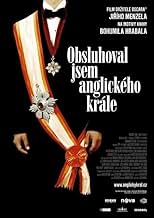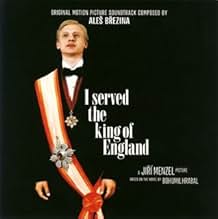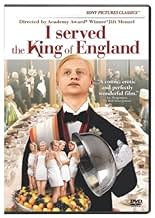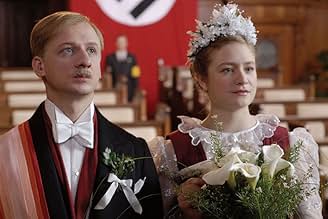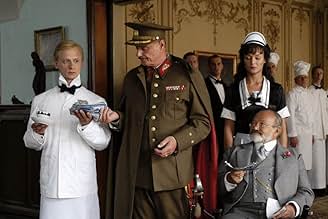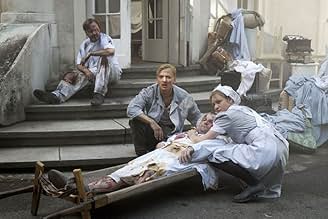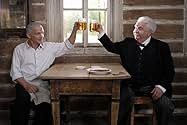IMDb रेटिंग
7.3/10
8.4 हज़ार
आपकी रेटिंग
अपनी भाषा में प्लॉट जोड़ेंA look at the glamorous life at an old-world Prague hotel.A look at the glamorous life at an old-world Prague hotel.A look at the glamorous life at an old-world Prague hotel.
- पुरस्कार
- 12 जीत और कुल 13 नामांकन
फ़ीचर्ड समीक्षाएं
I got a bit of a shock when I saw this film. It doesn't seem to follow the rules of contemporary film-making--in other words, women aren't shown as fully equal to men (although they can be very resourceful in dealing with petty tyranny) and the hero shows no sign of resentment for the way he is treated. I felt a lot closer to the great works of the heyday of classic film by Cukor, Ophuls and Lubitsch. The story unfolds calmly and logically, whether the events take place in the 30's, 40's or 50's of the last century. Ivan Barnev as the young Jan is superb: funny, roguish and balletic (just watch how gracefully he swoops around the restaurant with that heavy tray; wonder how much rehearsal time that needed.) Jiri Menzel made Closely Watched Trains, then saw his career go into eclipse after the Soviet invasion in 1968. The work he has done since hasn't come to my attention until now. This may be his swan-song, since he is 70 now, but I hope not.
Menzel, faithful to Hrabal, shows the Fall of Czech Man - and Sudeten German Woman - and their expulsion from their respective Middle-European idylls: They tragically fall into each other's arms just as global issue is joined that soon disillusions our Romeo and destroys his (now unfortunately rampantly Nazi) Juliet.
Neither the quiet life of getting rich and enjoying all the pleasures money can bring, nor the stirring Wagnerian strains of Germanic supremacist idealism, can survive, but our opportunistic anti-hero, Ditie (a name which can translate as 'little man') is more adaptable, because his ideals are more pliant to the accidents of fate than his German wife's rigid Hitlerite fanaticism, and consequently he is eventually able to emerge from a sort of Communist Purgatory with a keen appreciation of life's real and much simpler necessities.
With profound irony, it is in a smashed and ethnically cleansed Sudeten German village that an older and a wiser Ditie's rehabilitation is completed. And it is from this sobering perspective that he can finally both regret the excesses and errors of his life, and yet also take nostalgic pleasure from what was, after all, the wonderful, glittering, profoundly human spectacle of folly and grandeur which his life has been! Far from tragic or depressing, therefore, this film of the 20th century debacle of a nation ruined remarkably concludes with a very Czech endorsement of the simple, inoffensive pleasure in life which will always console this patient people at the troubled heart of darkest Europe: Ditie allows himself to enjoy a tankard of Pilsener beer - and Menzel's camera seems to gild the moment with as much gloriously sensuous golden dreaminess and spiritual fulfillment as ever bloated millionaire or romantically excessive idealist knew.
At last, the little man has found his fulfillment where it always lay: in the little things. At last, old, disillusioned and unseduced any longer by the world's headier attractions, Ditie finds himself at home and happy.
Here, the film seems to be saying, is the real idyll to which the Czech person should retire for refreshment of the soul, and not those false - though fabulous - ones we have been forced to discard.
Just as Ditie observes that his own career of accidents always turned out well, so in this perspective the Czech experience seems, on the whole, to have turned out for the best. This optimistic fatalism seems typical of the Czech way of seeing things, and is as characteristic of this film of Menzel's old age as it was of his early masterpiece, 'Closely observed trains.' On this view, it would be churlish to condemn the film for self-indulgence, as many Western critics have done. Frankly, they haven't suffered so much, so what do they know of ethical conundrums and the moral paradoxes of survival? This meditation on the more inglorious struggles of the insignificant and friendless to survive deserves our respect, not an easy and priggish contempt. This must especially be true in the country which lies behind the heavily loaded title 'I served the King of England,' for this heavy hint must surely prick that particular national conscience with its role in one of history's most blatant acts of betrayal. The title practically dares any English commentator to judge Ditie in his historical predicament!
(There is also considerable satisfaction to be had by the viewer from the sheer technical finesse of the film's production, on every level. Jiri Menzel's craft is also hugely impressive in scene after scene, which are turned with complete mastery of tragi-comic effect. But this is a study for another occasion.)
Neither the quiet life of getting rich and enjoying all the pleasures money can bring, nor the stirring Wagnerian strains of Germanic supremacist idealism, can survive, but our opportunistic anti-hero, Ditie (a name which can translate as 'little man') is more adaptable, because his ideals are more pliant to the accidents of fate than his German wife's rigid Hitlerite fanaticism, and consequently he is eventually able to emerge from a sort of Communist Purgatory with a keen appreciation of life's real and much simpler necessities.
With profound irony, it is in a smashed and ethnically cleansed Sudeten German village that an older and a wiser Ditie's rehabilitation is completed. And it is from this sobering perspective that he can finally both regret the excesses and errors of his life, and yet also take nostalgic pleasure from what was, after all, the wonderful, glittering, profoundly human spectacle of folly and grandeur which his life has been! Far from tragic or depressing, therefore, this film of the 20th century debacle of a nation ruined remarkably concludes with a very Czech endorsement of the simple, inoffensive pleasure in life which will always console this patient people at the troubled heart of darkest Europe: Ditie allows himself to enjoy a tankard of Pilsener beer - and Menzel's camera seems to gild the moment with as much gloriously sensuous golden dreaminess and spiritual fulfillment as ever bloated millionaire or romantically excessive idealist knew.
At last, the little man has found his fulfillment where it always lay: in the little things. At last, old, disillusioned and unseduced any longer by the world's headier attractions, Ditie finds himself at home and happy.
Here, the film seems to be saying, is the real idyll to which the Czech person should retire for refreshment of the soul, and not those false - though fabulous - ones we have been forced to discard.
Just as Ditie observes that his own career of accidents always turned out well, so in this perspective the Czech experience seems, on the whole, to have turned out for the best. This optimistic fatalism seems typical of the Czech way of seeing things, and is as characteristic of this film of Menzel's old age as it was of his early masterpiece, 'Closely observed trains.' On this view, it would be churlish to condemn the film for self-indulgence, as many Western critics have done. Frankly, they haven't suffered so much, so what do they know of ethical conundrums and the moral paradoxes of survival? This meditation on the more inglorious struggles of the insignificant and friendless to survive deserves our respect, not an easy and priggish contempt. This must especially be true in the country which lies behind the heavily loaded title 'I served the King of England,' for this heavy hint must surely prick that particular national conscience with its role in one of history's most blatant acts of betrayal. The title practically dares any English commentator to judge Ditie in his historical predicament!
(There is also considerable satisfaction to be had by the viewer from the sheer technical finesse of the film's production, on every level. Jiri Menzel's craft is also hugely impressive in scene after scene, which are turned with complete mastery of tragi-comic effect. But this is a study for another occasion.)
10sjbrook1
Like the butler played by Anthony Hopkins in the 1994 film "The Remains of the Day", the waiter at the centre of "I Served the King of England" (Jiri Menzel, Czech Republic, 2006) is not interested in politics. Major historical events surround him, yet these completely escape his attention. His ambition is simply to become a millionaire, like the fat cats he serves at table. In 1930s Prague, Hitler, in Berlin, is making a radio announcement about his aim to "liberate" the Sudetenland. Bored, Jan Dite, the waiter, simply turns the dial to a dance music station.
He manages to float through the Nazi invasion, first of the Sudetenland, then of Czechoslovakia. By a combination of hook and crook, he achieves his ambition of owning his own hotel through the sale of valuable stamps, stolen from a vanished Jewish family. This does not give him a moment's pause but later, when he sees a trainload of Jews in cattle-cars moving off to Auschwitz, he has a rush of compassion and chases after the train in an attempt to hand the deportees a sandwich. After the war, as a self-confessed millionaire, he is sent to prison when his hotel is nationalised. He emerges fifteen years later, older, but not much wiser. He is Schweik, but without the latter's sly intelligence.
This sketchy summary cannot do justice to a film which has been described as a near-flawless masterpiece, in which "Prague has never looked better". It is permeated with the ironic wit which marked Menzel's earlier films, such as the Academy Award winning Closely Watched Trains (1966). Dite befriends the German girl Liza, described by one reviewer as "the sweetest little Nazi in the history of the cinema". They are in bed, making love in the missionary position. Liza keeps pushing his head aside so that she can gaze at the big picture of Adolf Hitler on the opposite wall. Such was love in the Third Reich. The scene in which Dite is undergoing a racial fitness test which involves giving a sperm sample is intercut with young Czech men being unloaded from a lorry at an execution ground. Of this, Dite is blissfully unaware.
The Remains of the Day was based on a serious and perceptive novel by Kazuo Ishiguro. The genesis of I Served the King of England, by contrast, was a comic novel by Bohumil Hrabal, a book I cannot wait to get my hands on. Any offers?
He manages to float through the Nazi invasion, first of the Sudetenland, then of Czechoslovakia. By a combination of hook and crook, he achieves his ambition of owning his own hotel through the sale of valuable stamps, stolen from a vanished Jewish family. This does not give him a moment's pause but later, when he sees a trainload of Jews in cattle-cars moving off to Auschwitz, he has a rush of compassion and chases after the train in an attempt to hand the deportees a sandwich. After the war, as a self-confessed millionaire, he is sent to prison when his hotel is nationalised. He emerges fifteen years later, older, but not much wiser. He is Schweik, but without the latter's sly intelligence.
This sketchy summary cannot do justice to a film which has been described as a near-flawless masterpiece, in which "Prague has never looked better". It is permeated with the ironic wit which marked Menzel's earlier films, such as the Academy Award winning Closely Watched Trains (1966). Dite befriends the German girl Liza, described by one reviewer as "the sweetest little Nazi in the history of the cinema". They are in bed, making love in the missionary position. Liza keeps pushing his head aside so that she can gaze at the big picture of Adolf Hitler on the opposite wall. Such was love in the Third Reich. The scene in which Dite is undergoing a racial fitness test which involves giving a sperm sample is intercut with young Czech men being unloaded from a lorry at an execution ground. Of this, Dite is blissfully unaware.
The Remains of the Day was based on a serious and perceptive novel by Kazuo Ishiguro. The genesis of I Served the King of England, by contrast, was a comic novel by Bohumil Hrabal, a book I cannot wait to get my hands on. Any offers?
Maybe, like me, you don't know that much about the history of the country wherein sits Prague, and its remnants of regal splendour. After watching I Served the King of England, you will know more. A lot more. The politics. The humour. The cultures. The aspirations. The troubled relations with neighbouring empires. And the incredible resilience of its individuals.
I Served the King of England is very ambitious. It condenses an epic novel into two hours and squeezes in more styles than a catwalk. There are nods to the wit of Charlie Chaplin. The visual eulogies of Peter Greenaway. Penitentiaries, bars, brothels, woods, invading armies. All are collected in a dizzying montage as Jan Díte reviews the highs and lows of his life and loves in flashback.
He has just been released from Prague Correctional Facility, having served almost 15 years. He is also in rather humble circumstances. This seems to contrast with his lifelong and apparently successful ambition to become a millionaire. The first half of the film has a theatrical feel of unreality much like a musical. Serving lad Díte manages to score with a local beauty at the nearby bordello. He then get various jobs that involve him working with sophisticated women of pleasure, or in top hotels, or sometimes both together. His short stature enables him to play many tricks, like surreptitiously throwing a handful of coins on the ground for the pleasure of watching rich men get down on their hands and knees with their bums in the air. One of his favourite penchants with the ladies, on the other hand, is to ornament their naked and prostrate forms with anything from flowers, to fruit, to funds from his growing pocket book. One particularly striking moment is when he decorates a naked brothel girl (who looks worryingly like Kylie Minogue) in large margarita daisies. The scene is as arresting as the nude-and-rose-petals shot in American Beauty, or the female-served-for-dinner in The Cook The Thief His Wife & Her Lover.
Menzel's taste for a decadent protagonist is in no way sullied by shame. His whores are creatures of beauty: "The scent of raspberry trailed behind her. She stepped out in that silk dress, full of peonies, and bees hovered around her like a Turkish honey store." ('Bees' you will note, not 'flies'.) The description follows an incident where the lady in question pours raspberry grenadine over herself - to stop Díte from getting into trouble.
I Served the King of England soon becomes rife with political and social comment, even before we get to the eponymous and very loaded comment by Díte's boss boasting his resumé. Having treated us to sumptuous society, the film reminds us of the cost: "I discovered that those who said 'work is ennobling' were the same men who drank all night and ate with lovely young ladies seated on their knees." The palatial buildings, over-refined manners and ostentatious egregiousness of old Europe belie the fabled shangrila on which they are modelled. As we witness the Nazi and then Communist take-overs, the film touches on many issues that have affected the creation and difficult continuation of the country now known as the Czech Republic. Amusingly, the Nazi ideal of 'racial purity' enables Díte to continue his lifestyle - his German fiancé secures him a job at a breeding ground for top military studs.
The best parts of the film are full of beauty and sadness. An old man reminisces: "We, in the 20th century, are inclined to see the glory in ourselves and the shame in others that's how the mess got started." The latter half of the film gradually becomes more serious in tone, even didactic. Here is your history lesson, insight into human nature, poetry and great literary adaptation all in one, it seems to be saying to us.
I Served the King of England is a film on an enormous scale. It makes a valiant attempt to be a masterpiece, but feels as if it didn't have quite enough time to display its flaunted genius. One cannot help but admire it. Even if it doesn't quite reach the dizzying heights to which it aspires.
I Served the King of England is very ambitious. It condenses an epic novel into two hours and squeezes in more styles than a catwalk. There are nods to the wit of Charlie Chaplin. The visual eulogies of Peter Greenaway. Penitentiaries, bars, brothels, woods, invading armies. All are collected in a dizzying montage as Jan Díte reviews the highs and lows of his life and loves in flashback.
He has just been released from Prague Correctional Facility, having served almost 15 years. He is also in rather humble circumstances. This seems to contrast with his lifelong and apparently successful ambition to become a millionaire. The first half of the film has a theatrical feel of unreality much like a musical. Serving lad Díte manages to score with a local beauty at the nearby bordello. He then get various jobs that involve him working with sophisticated women of pleasure, or in top hotels, or sometimes both together. His short stature enables him to play many tricks, like surreptitiously throwing a handful of coins on the ground for the pleasure of watching rich men get down on their hands and knees with their bums in the air. One of his favourite penchants with the ladies, on the other hand, is to ornament their naked and prostrate forms with anything from flowers, to fruit, to funds from his growing pocket book. One particularly striking moment is when he decorates a naked brothel girl (who looks worryingly like Kylie Minogue) in large margarita daisies. The scene is as arresting as the nude-and-rose-petals shot in American Beauty, or the female-served-for-dinner in The Cook The Thief His Wife & Her Lover.
Menzel's taste for a decadent protagonist is in no way sullied by shame. His whores are creatures of beauty: "The scent of raspberry trailed behind her. She stepped out in that silk dress, full of peonies, and bees hovered around her like a Turkish honey store." ('Bees' you will note, not 'flies'.) The description follows an incident where the lady in question pours raspberry grenadine over herself - to stop Díte from getting into trouble.
I Served the King of England soon becomes rife with political and social comment, even before we get to the eponymous and very loaded comment by Díte's boss boasting his resumé. Having treated us to sumptuous society, the film reminds us of the cost: "I discovered that those who said 'work is ennobling' were the same men who drank all night and ate with lovely young ladies seated on their knees." The palatial buildings, over-refined manners and ostentatious egregiousness of old Europe belie the fabled shangrila on which they are modelled. As we witness the Nazi and then Communist take-overs, the film touches on many issues that have affected the creation and difficult continuation of the country now known as the Czech Republic. Amusingly, the Nazi ideal of 'racial purity' enables Díte to continue his lifestyle - his German fiancé secures him a job at a breeding ground for top military studs.
The best parts of the film are full of beauty and sadness. An old man reminisces: "We, in the 20th century, are inclined to see the glory in ourselves and the shame in others that's how the mess got started." The latter half of the film gradually becomes more serious in tone, even didactic. Here is your history lesson, insight into human nature, poetry and great literary adaptation all in one, it seems to be saying to us.
I Served the King of England is a film on an enormous scale. It makes a valiant attempt to be a masterpiece, but feels as if it didn't have quite enough time to display its flaunted genius. One cannot help but admire it. Even if it doesn't quite reach the dizzying heights to which it aspires.
this is a farce in part, but i do wonder why there's the great American need to qualify this movie. so one will know the correct response, perhaps? aw, just sit back and be enlightened. if more folks had laughed at the Nazis they wouldn't have made it into power. and as for the woman being portrayed as lesser than the man, this is called history, folks. the movie is charming. barney is a mime's delight. and the sex is delicious, and certainly not raunchy as one reviewer on the DVD writes. i always find it stimulating to have to curb my love of MTV editing and car chases and to let the different pace of the European style wash over me. ah tempora, ah mores.
क्या आपको पता है
- ट्रिवियाThe scenes for the Hotel Pariz restaurant were filmed in the main restaurant in Prague's Obecni Dum (Civic House), just around the corner from the actual Hotel Pariz. Both restaurants were designed in the Art Nouveau style by artist Alphons Mucha, but the Obecni Dum restaurant is larger.
- गूफ़Jan sees a train full of people being deported to a concentration camp. A closeup of one of the cars shows men within wearing gray and white striped uniforms. However, deportees were sent to the camps wearing their civilian clothes and weren't issued uniforms until after they arrived.
- भाव
Jan Díte, older: A person becomes most human, often against his own will, when he begins to founder, when he is derailed and deprived of order.
- कनेक्शनEdited into CzechMate: In Search of Jirí Menzel (2018)
टॉप पसंद
रेटिंग देने के लिए साइन-इन करें और वैयक्तिकृत सुझावों के लिए वॉचलिस्ट करें
- How long is I Served the King of England?Alexa द्वारा संचालित
विवरण
- रिलीज़ की तारीख़
- कंट्री ऑफ़ ओरिजिन
- आधिकारिक साइटें
- भाषाएं
- इस रूप में भी जाना जाता है
- I Served the King of England
- फ़िल्माने की जगहें
- उत्पादन कंपनियां
- IMDbPro पर और कंपनी क्रेडिट देखें
बॉक्स ऑफ़िस
- बजट
- CZK 8,44,50,000(अनुमानित)
- US और कनाडा में सकल
- $6,17,403
- US और कनाडा में पहले सप्ताह में कुल कमाई
- $53,218
- 31 अग॰ 2008
- दुनिया भर में सकल
- $73,54,478
- चलने की अवधि1 घंटा 53 मिनट
- रंग
- ध्वनि मिश्रण
- पक्ष अनुपात
- 1.85 : 1
इस पेज में योगदान दें
किसी बदलाव का सुझाव दें या अनुपलब्ध कॉन्टेंट जोड़ें


